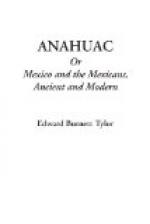Popocatepetl means “Smoking Mountain.” The Indians naturally enough considered it to be the abode of evil spirits, and told Cortes and his companions that they could never reach the top. One of the Spaniards, Diego Ordaz, tried to climb to the summit, and got as far as the snow; whereupon he returned, and got permission to put a burning mountain in his coat of arms, in commemoration of the exploit! If, as he declared, a high wind was blowing, and showers of ashes falling, his turning back was excusable, though his bragging was not. He seems to have afterwards told Bernal Diaz that he got to the top, which we know, by Cortes’ letters to Spain, was not true. A few years later, Francesco Montano went up, and was lowered into the crater to get sulphur. When Humboldt relates the story, in his New Spain, he seems incredulous about this; but since the Essai Politique was written the same thing has been regularly done by the Indians, as the merest matter of business, until the crater has been fairly worked out.
We took our last look at Mexico from the ridge of the crater, and, descending twenty feet at a stride, soon reached the bottom of the cone. As far as we could see, the substance of the hill seemed to be of basaltic lava, which was mostly covered with the lapilli which I have spoken of before as ashes and volcanic sand. Even before we reached the pine-forest there was evidence of the action of water, which had covered the slope of the mountain with beds of thick compact tufa, composed of these lapilli mixed with fragments of lava. The water-courses had cut deep channels through these beds, and down into the rock below; so that the streams from the melted snow rushed down between walls of lava, in which traces of columnar structure were observable.
The snow we had travelled over was sometimes dry and powdery, and sometimes hard and compact. There were no glaciers, and no glacier-ice, properly so called. It never rains at this elevation; and, though evaporation goes on rapidly with half the pressure taken off the air, and a great increase in the intensity of the sun’s rays, the snow either passes directly into vapour, or carries the water off instantaneously, as it is formed. Only so much water seems to be produced and re-frozen as suffices to make the snow hard, and in some favourable places near the rocks to form lumps of ice, and some of those great icicles which the Spaniards brought down from the mountain on their first expedition, so greatly astonishing their companions.
When we reached the rancho we thought of passing another night there; but the Indians who had gone down to the valley for corn had not returned, and everything was eaten up except beans, which are all very well as accessories to dinner, but our English digestions could not stand living upon them; so we started at once for San Nicolas de los Ranchos. Our ride was down a deep ravine, by the side of a mountain-torrent




